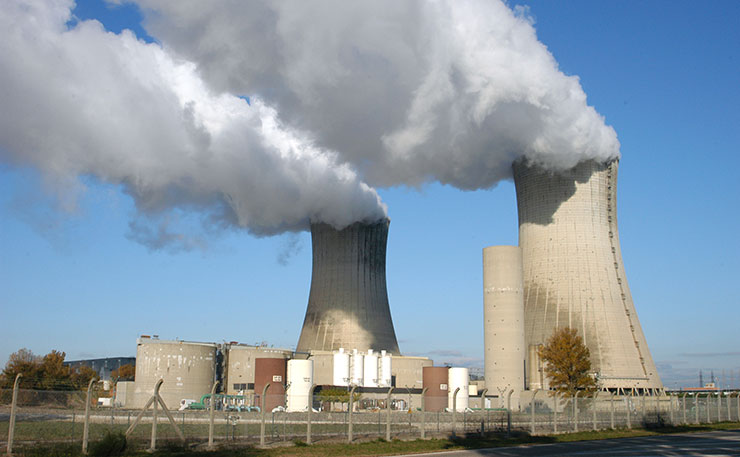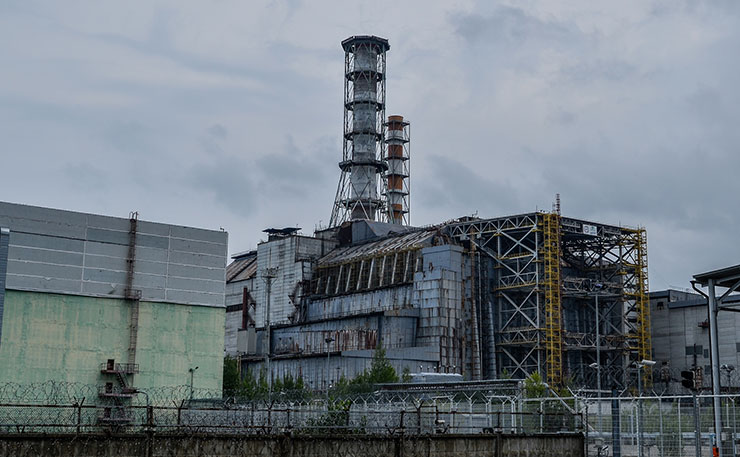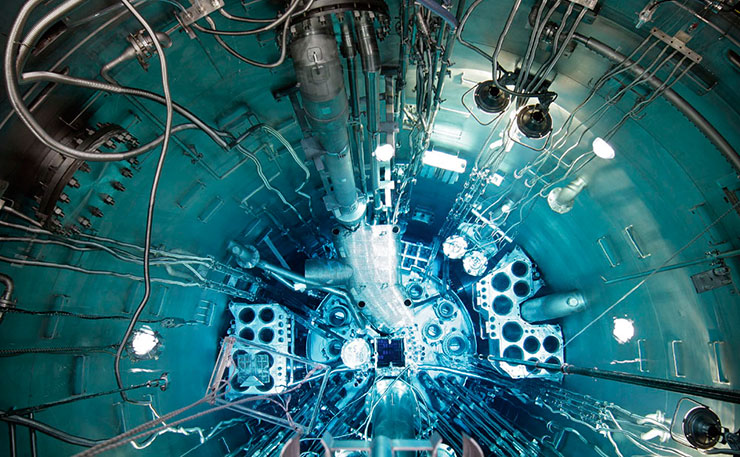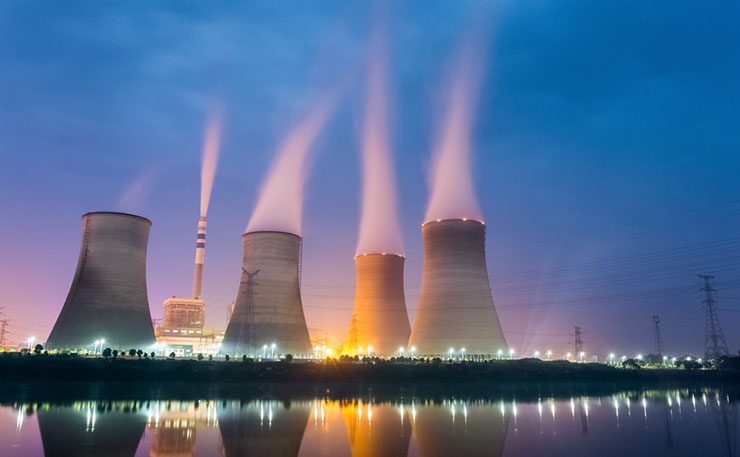DON’T MISS ANYTHING! ONE CLICK TO GET NEW MATILDA DELIVERED DIRECT TO YOUR INBOX, FREE!
The nuclear energy ‘industry’ in Australia should be dead, but somehow it keeps getting revived. Dr Darrin Durant weighs in in New Matilda’s ongoing series on ‘the nuclear option’.
It is just a little past Nuclear Groundhog Day in Australia. A 2019 parliamentary inquiry into the conditions under which future Governments might consider nuclear power in Australia recently concluded that emerging nuclear technologies were a clean energy pathway for Australia.
This recommendation was immediately opposed by Labor and the Greens, and even opened up divisions within the Coalition, while also failing to resolve how partially lifting Australia’s nuclear ban (for one type of nuclear generating technology) could practically work.
Much ink and even more pixels have been and will continue to be splayed everywhere on this polarized issue, but the untold story of the nuclear option is that it is in fact a technological form of Creationism. Let me explain.
Nuclear power is like a wild goose chase where the goose is a zombie that cannot be killed. The nuclear option in Australia has been buried at least three times previously, only to be brought back from the dead.
Nuclear power was originally prohibited by legislation. Section 10 of the Australian Radiation Protection and Nuclear Safety Act 1998 prohibits fuel fabrication, enrichment or processing, and nuclear reactors. Section 140A of the Environmental Protection and Biodiversity Conservation Act 1999 prohibits the federal Minister from approving an action leading to such installations.
Yet a federal Government review of 2006 (the Switkovski Report) considered the potential to establish such installations, although it concluded nuclear power in Australia was uneconomic.
A 2016 South Australian royal commission to investigate the potential for SA to participate in the nuclear fuel cycle similarly concluded nuclear power in Australia was not commercially viable.
BE PART OF THE SOLUTION: WE NEED YOUR HELP TO KEEP NEW MATILDA ALIVE. Click here to chip in through Paypal, or you can click here to access our GoFundMe campaign.
Nuclear power does not affect its own resurrection by virtue of its own divine power. Instead, like Lazarus was said to have been resurrected by Jesus four days after retirement, nuclear power has divine ideologues on its side. Obviously not the Labor Party, which thinks resurrecting the nuclear option signals the indulging of political fantasies, nor the Greens, who think resurrecting the nuclear option is the stuff of crackpot lunatic cowboys.
Instead, as Jim Green from Friends of the Earth wrote, it is right-wing ideologues who continually resurrect nuclear power, in a culture war trying to wedge the political Left. Or as the economist John Quiggin wrote, support for nuclear power is de facto support for coal.
Given the decades of lead time required for nuclear power to feed into the electricity grid and, assuming publics and politicians swallow the argument that renewables cannot satisfy base-load power requirements, coal is advertised as the only viable option until nuclear comes online.
The technological creationism of nuclear power
But the nuclear option has more than the business-as-usual commitments of right-wing ideologues on its side. The nuclear option has inherited an argumentative strategy from American Creationists, which the evolutionary biologist Eugenie Carol Scott coined the Gish Gallop.
Named after the Creationist Duane Gish, Scott wrote that the strategy involves making “a simple declarative sentence, and you have to deal with not an easily-grasped factual error, but a logical error and a methodological error, which will take you far longer to explain… [Creationists present] half-truth non-sequiturs that the audience misunderstands as relevant points. These can be very difficult to counter in a debate situation, unless you have a lot of time. And you never have enough time to deal with even a fraction of the half-truths or plain erroneous statements”.

We can miss the Gish Gallop at the heart of pro-nuclear advocacy if we chase the controversy. We know nuclear power is politically polarizing and it is easy to report on clashing protagonists making seemingly alternate-reality claims.
Thus the Australia Institute’s submission to the parliamentary inquiry dismissed nuclear power as uneconomic, climate unfriendly because of high water use in an already drought-prone Australia, and as lacking a social license. In black mirror fashion, the Minerals Council of Australia strongly supported nuclear power as affordable, climate friendly because of zero-emissions, and as enjoying rising public support.
Like chasing Creationists down the rabbit holes of their homespun Gish Gallops, opponents of nuclear power can spend a fruitless amount of intellectual and emotional energy rebutting half-truths and methodological sleights of hand. The fruitlessness stems from earnestly interpreting the opponents’ claims ‘straight’ and tackling them head on.
For instance, the Minerals Council of Australia (MCA) argues that nuclear power is affordable and that Small Modular Reactors (SMR) represent a cheap and feasible option for Australia. By contrast, the (independent) World Nuclear Industry Status Report (WNISR; September 2019) found that nuclear power costs 5-10 times more per kWh than renewables, and that there is no sign of a technological or commercial breakthrough that would render SMRs viable.
Similarly, the MCA argues that climate change is real, and that nuclear power is the only way Australia can meet our Paris Agreement goals without sacrificing jobs and prosperity. But are the MCA really climate defenders?
The thinktank InfluenceMap – which tracks climate policy opponents – ranks the MCA -59 (or 8th worst Trade Group) in its carbon policy footprint scores (-100 is highly and negatively influencing climate policy; +100 highly and positively influencing climate policy).
Unfortunately, straight rebuttals matter little to technological creationists. Anything can be cheap, depending upon how you trim the costs. Everything can be feasible, depending upon your tolerance for fantasy. Anyone can be green, depending upon your degree of gullibility.
The difficulty presented by the Gish Gallop argumentative strategy is that only on the surface is the critic confronted by factual claims open to empirical challenge. Deeper down, we have pregnant misdirection, diversionary reframing, and strategic incompleteness. The strategy does not even have to be deliberate gaslighting, where the aim is to disorient and destabilize the audience in a quest to leave the speaker the beneficiary of the disenchantment of truth.

Instead, the Gish Gallop simply entices the audience to run off in multiple directions at once, earnestly looking for the grounding of a claim that is in fact a groundless fog.
For instance, are nuclear reactors zero emissions, as the MCA claims? There is a grain of truth there, if the nuclear life cycle is restricted to reactor operation.
But as the energy analyst and environmentalist Mark Diesendorf has shown, to calculate the emissions from nuclear power one must account for fossil fuel use in every other aspect of the nuclear life cycle (mining, milling, fuel fabrication, enrichment, reactor construction, decommissioning and waste management). Moreover, the lower the grade of uranium ore, the higher the resulting emissions, so that nuclear power will emit more CO2 over time as higher-grade ores are used up.
Some analysts try to be fair, concluding that emissions from nuclear power are neither zero nor high and made complex by multiple uncertainties, or that unstated assumptions about the carbon footprints of energy supplied in the non-operational phases of the nuclear fuel cycle strongly determine the ultimate carbon footprint.
But notice how it is the audience that must supply the context for assessing pro-nuclear technological creationist claims? The necessary context for assessing claims – zero emissions, etc. – is wilfully deleted from the message itself.
Similarly, the MCA writes that SMRs ‘are simply an evolution of a proven mature technology’. Specific claims about an unproven technology (SMR) are then treated as general warrants for a technology which possesses an actual track record (where the track record is not supplied).
Again, straight responses are possible. The anti-nuclear activist Noel Wauchope lists seven reasons why SMRs are unwise, and Quiggin questions whether the plant that is supposedly going to manufacture the technology even exists.
But it is the context deleted by the MCA that is of most relevance, so we must ask about the track record of this ‘mature’ technology and whether SMRs are just an unproblematic next step. The maturity claim typically means nuclear technology has benefited from economies of scale and social learning, so that construction times and costs would go down over time.
But as the WNISR2019 (and previous versions) shows, nuclear power lacks an upward learning curve. Reactor cost blowouts in time and money have been the norm since the technology’s inception. SMRs have inherited that legacy, with a survey of eight countries showing SMRs are even less economically competitive than large nuclear plants.
The Gish Gallop strategy here is simply to delete history from the evaluative criterion. But historically-informed judgments matter, as energy policy specialists like Benjamin Sovacool realize, writing that SMRs are almost entirely rhetorical fantasies built upon utopian expectations.
Indeed, the broader case for nuclear power in Australia is similarly built upon a Gish Gallop strategy of strategic deletion perversely coupled with proliferating half-truths.
For instance, the MCA claims that surveys indicate increasing public support for nuclear power. But closer analysis shows that support varies if nuclear power is framed as a solution to climate change, indicating the support may reflect desired action on climate change itself. Moreover, most have no desire to live near a reactor.

The MCA also advocates a ‘technology neutral’ approach, which sounds reasonable and is typically generalized to mean climate change is so serious we must pursue all energy technologies at once. When Malcolm Turnbull was Prime Minister in 2017, he argued that an ‘all of the above’ approach was critical to future energy supplies. The American environmentalist Stewart Brand wrote in 2009 that climate change is so serious we have to do everything simultaneously, pursuing all ‘climate wedges’ at the same time.
But this entire argument about a technology-neutral approach being premised on the need to pursue all elements in an energy portfolio at once rests on wilfully deleting the context for assessing energy choices. The climate wedge idea derives from a 2004 paper by Stephen Pacala and Robert Socolow. A wedge represents an activity that reduces emissions to the atmosphere starting at zero today and increases linearly until it accounts for one billion metric tonnes of reduced carbon emissions in 50 years.
But as Pacala and Socolow noted, “although no element is a credible candidate for doing the entire job (or even half the job) by itself, the portfolio as a whole is large enough that not every element has to be used”.
Not every element! The technology-neutral, all-of-the-above approach is both bad energy economics and deceptive politics, because passive and complacent business-as-usual masquerades as active and concerned political choice.
Was democratic debate really meant to be this way?
When we say democratic debate is about letting each side have its say, is the kind of argumentative sleight of hand practiced by pro-nuclear technological creationists really what we were imagining?
To anticipate a reply that might be offered as complementary but is a mistake: no, truth is not the answer. Truth can be despotic, as the political philosopher Hannah Arendt argued in 1967, peremptorily demanding to be recognized and precluding debate by relying on the coercive force of self-evidence. Or put differently, truth is great when you have it on your side, until everyone claims it is on their side, and politics reduces to who coerces last.
But nor is the abandonment of truth to opinion the answer either. In the phrase of another political philosopher, Nadia Urbinati, to be unpolitical is to remove an issue in need of deciding from the open arena of competing political visions, political groups, and partisan views. Urbinati advises we defend the merits of political deliberation, because it allows for contestation and revision, and be wary of forensic decisions by experts.
But is a little more of the unpolitical – a little less political deliberation – sometimes a wise move? Do you ever get the feeling that the continual resuscitation of the nuclear power option is just one more continual delay in meaningful reform of our energy portfolio? One more continual delay in meaningful reduction of CO2 emissions and the shifting of the electricity grid toward significant incorporation of renewables?
The nuclear power option has had its day but lives to tell another day because we tell ourselves that debating all the options is always good, even if we should really be saying some option needs to be retired.
BE PART OF THE SOLUTION: WE NEED YOUR HELP TO KEEP NEW MATILDA ALIVE. Click here to chip in through Paypal, or you can click here to access our GoFundMe campaign.
The context at work making this continual resuscitation possible is not just the persistence of business-as-usual elites, but the political ecology in which those elites reside. Political populism radically polarizes public forums and delegitimates the independent advice-giving institutions of democracy. Media and cultural partisans have turned political deliberation into a spectator sport. The business-as-usual ethos exploits that weakened ground of consensus-formation to suggest old options are better than new options.
As the historian of science Steven Shapin has suggested, we are facing a crisis of truth not because facts are being routinely contested or even because facts are being routinely made up, but because our institutions are suffering a crisis of authority and legitimacy. We have lost track of who knows and does not know, which is a dearth of social knowledge about reputation and integrity.
Keeping the spectre of nuclear power at bay will require rethinking our institutions and how they can assist in making the objects of our political deliberation worthy objects. We can neither give up on experts nor citizens, but we do need to revisit how we think about each.
As myself and some fellow sociologists of science have argued, experts at the service of business-as-usual will never escape institutional delegitimisation effects, so we must look to expertise playing the role of a check and balance within our pluralist democracies. Similarly, citizens do need to engage with public claims to test their contextual merits and coherency.
But as analysts of public participation like Matthew Kearnes and Jason Chilvers have warned, until organizations and institutions are more transparent and candid about their assumptions, values and interests, the burden of proof will fall unevenly on the less powerful.
In each case, experts and citizens, what we need from them is interrogation of context. Not simply can they be our fact checkers, but can they be our redeemers of context, our arbiters of whether half-truths are masquerading as full claims, and our unmaskers of the pretenders at coherence?
DON’T MISS ANYTHING! ONE CLICK TO GET NEW MATILDA DELIVERED DIRECT TO YOUR INBOX, FREE!
Donate To New Matilda
New Matilda is a small, independent media outlet. We survive through reader contributions, and never losing a lawsuit. If you got something from this article, giving something back helps us to continue speaking truth to power. Every little bit counts.




